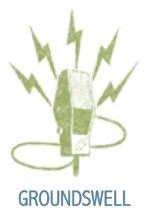
By Gheni Platenburg
Social unrest and violence have always created a need for activism. While protests, boycotts and, more recently, social media campaigns have all become common ways to express dissent and call for change, researchers have also found ways to fight against injustice. In recent years, oral history has increasingly emerged as a form of resistance.
Groundswell: Oral History for Social Change worked to promote oral history as an advocacy tool. Groundswell was an international network of oral historians; activists; cultural workers; community organizers; and documentary artists that “use oral history to further movement building and transformative social change.”[1] To accomplish these goals, the network provided “mutual support, training, and resources in the practice of applied, community-based oral history.”[2]
I attended the organization’s fall 2019 introductory training workshop in hopes of learning additional approaches to expanding my oral history work beyond academic journals. Over the course of six weeks, Groundswell members led my cohort through an intense online training consisting of lectures, in-class activities, homework and assigned readings.[3] Like the organization itself, my cohort was also composed of people from different geographic locations, professions and fields of study.
From the start, trainers sought to establish the value of oral histories beyond the general collection, preservation, and analysis of historical accounts. Instead, they encouraged we also view the methodology as “a source of power, knowledge and strength in our struggles for justice” that “provides a unique space for those most impacted by injustice to speak and be heard in their own voices.”[4] I saw this as an opportunity to move beyond a reactive standpoint in my role as a researcher to a more proactive role.
While trainers did review the basics of ethics, interview techniques and recording equipment, a large amount of the training was spent teaching the foundations of developing collaborative community oral history projects. These teachings provided guidance on building community connections, locating funding and finding strategy within stories. In my opinion, one of the best parts of the course was learning about all the different types of oral history projects underway.
One such example was the Anti-Eviction Mapping Project,[5] a “data-visualization, critical cartography, and multimedia storytelling collective documenting dispossession and resistance upon gentrifying landscapes,” primarily in San Francisco, Los Angeles and New York City.[6] The project’s website provides everything from the oral histories of residents to helpful information about tenants’ rights to a searchable database for area evictions and a digital form to submit reports of landlords’ wrongdoings. Another example discussed during the course was the Tibetan Resettlement Stories project, a collection of stories of the first Tibetan immigrants to settle in Boston sharing their experiences of political exile and resettlement.[7] While neither example pertains to journalism history, both offered important applicable takeaways about project design and presentation.
A third example, Voice of Witness, is a “nonprofit that advances human rights by amplifying the voices of people impacted by—and fighting against—injustice.”[8] In addition to publishing oral histories, project administrators also provided a complementary curriculum. Furthermore, the course also offered information on additional innovative oral history audio projects including walking tours, site specific audio installations and participatory community dialogues.
The course was nothing short of transformative. At the end of the six weeks, I felt inspired, motivated, and ready to jump on projects. In academia, professors often strive for the holy grails of journal article publications as a measure of success. Admittedly, there are obvious benefits to this model of information dissemination. However, this course reminded me to also consider how I can share my work with non-academics in a way that is meaningful and creates reflection and if necessary, change. Amid the nation’s current fights for social and economic equality, Groundswell provided a group of colleagues and potential collaborators for those looking to serve as change agents.
[1]Groundswell: Oral History for Social Change, 2014, Retrieved from: http://www.oralhistoryforsocialchange.org/about .
[2] Ibid.
[3] A few examples of the course reading include the following: Donald A. Ritchie, Doing Oral History (New York, Oxford University Press, 2003) ; Martha Norkunas, “Teaching to Listen: Listening Exercises and Self-Reflexive Journals,” The Oral History Review 38, no. 1(2011): 63-108.
[4] Groundswell: Oral History for Social Change, Fall 2019 Class PowerPoint.
[5] Anti-Eviction Mapping Project, Retrieved from: https://antievictionmap.com/
[6] Anti-Eviction Mapping Project, “About Us,” Retrieved from: https://antievictionmap.com/about
[7] Tibetan Resettlement Stories Voices of Boston, Retrieved from: https://www.tibetanresettlementstories.org/
[8]Voice of Witness, Retrieved from: https://voiceofwitness.org/about/

